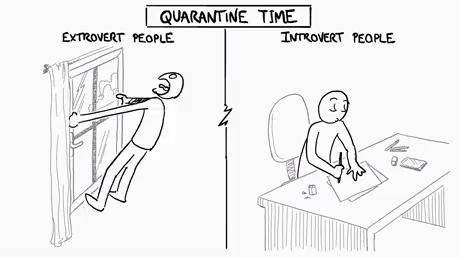Quiet Time Coaching: Episode 157


A week ago Charlie Hynes half-jokingly asked me for some tips to help introverts handle isolation. It set me thinking about the different challenges introverts and extroverts might be facing during this virus crisis.
We will look at extraversion next week, but for now let’s focus on introversion.
The first thing to say is that I don’t like the labels. It’s a very inexact science. I would suggest that most of us are somewhere along the spectrum between extreme introversion and extreme extroversion. Indeed, depending on the context, we become more or less introverted or extroverted. I am not going to attempt definitions, simply ask you to take whatever you find helpful from these two articles.
That having been said, it could be useful to consider the spiritual impact of social isolation on those of us with a more introverted nature.
I’m going to split the article into two parts. Part one – how an introvert can help themselves. Part two – how others can support an introvert. Specifically, I’m going to focus on spiritual matters more than physical and mental health issues. If you’re struggling with your mental health I strongly suggest you contact a medical professional.
Interestingly, when I sent out a message a week ago saying that I would be addressing this topic I had several people send me suggestions. All of them, I think, would self-identify as introverts. I’m not quite sure what that is telling me, but I would like to hear from some of the extroverts as well!
Here are a few selected comments from my correspondence:
Stephanie says: “As an introvert I don’t find lockdown too bad at all. I’m loving not having to traipse off to work or meetings….but what I find hard is not getting any alone time in the house.” She also mentioned the wonderful gif above.
Maxine says: “As a introvert I have found isolation more easy when I get creative with imagination but on the other hand I need to be watchful least I fall into…fantasy.”
Caroline provided this from an MBTI perspective: “Introverts get energised when given quiet time to reflect; they can go for hours being on their own – this recharges their batteries, helps them focus on what’s really important and can lead to great insights, ideas and less stress. Introverts may find this time wonderful for deep bible study.”
Barry wrote: “Being a serial introvert, this whole isolation thing, is like a dream come true….I can’t believe that I am encouraged to stay at home. It’s like Christmas except that it’s Easter!…One of the benefits of being an introvert….is that I can find plenty to do. I am doing a lot of reading, learning and reflecting, catching up on missed Ted Talks and some of my favourite podcasts, immersing myself in creative projects, taking on a theology course, participated in early morning football training with Joel ( 4 days each week at 5:30am) and countless interesting projects around the house….I journal every day….I made a decision to be intentional about having meaningful interactions and offering service to others. I have had a couple of phone conversations with a former neighbour with some mental health issues, who has found this time particularly hard. Myself and Nancy delivered some food to an elderly man flagged up by Age Concern as someone who couldn’t get out, I had a couple of deep spiritual conversations with [someone], I looked up some former colleagues and friends on Facebook and had some positive interactions with them bringing something of the Kingdom of God into their world. I have spoken to a few different neighbours and asked how they are and if I have been out and about at the supermarket. I decided to be a friendly face looking out for the interests of others rather than grab and go or being a stockpiler. I have made a point of thanking those who are working extra hard during this time such as those in the supermarkets.
Andy sent me this helpful PDF:
Harry and Bel told me this: “Bel and I are both introverts and often find attending a church of over 100 people quite challenging, especially since most of them seem to be extroverts. So, in some respects online church works better for us as does social distancing and being in lockdown.”
Thank you for those thoughts everyone. With that in mind, a few practical suggestions for the introvert:
Part one – how an introvert can help themselves spiritually
In point of fact, most of these principles apply to an extrovert just as much as an introvert.
1. Know yourself. Reflect on the signs that you know for yourself indicate whether you are handling challenges in a healthy spiritual way or not. I dare say you know what they are. Pray and ask God for discernment and then be honest with yourself as well as a friend.
2. Know what you’re aiming for. What would the most Christ-like version of yourself look like right now? In your isolation? In other words, not comparing yourself with extroverts, but getting a clear picture of your growth trajectory. What would the most Christ-like version of myself be doing?
3. Consider what has helped you in the past. Recall some situations when you were isolated and handled that isolation well. What was happening? Perhaps you were travelling alone, in hospital or prison. What went well for you? Could you take one or more of those practicals and implement them now? I don’t journal as a regular practice, but when I’m travelling alone it makes a big difference. I stay more connected with my spirit, with God, and the lessons that he is teaching me. Reading is another practice which supports my spiritual well-being. The more isolated I become, the more I need to read, and the more nourished I feel.
4. Reflect on your value to the community. The church needs all kinds of people. Your church community needs you. All of us have gifts, experiences and spiritual strengths needed by the body. You might like to make a list of yours so that you can more clearly see how to use them in ministering to the needs of others. “Now if the foot should say, “Because I am not a hand, I do not belong to the body,” it would not for that reason stop being part of the body. And if the ear should say, “Because I am not an eye, I do not belong to the body,” it would not for that reason stop being part of the body. If the whole body were an eye, where would the sense of hearing be? If the whole body were an ear, where would the sense of smell be? But in fact God has placed the parts in the body, every one of them, just as he wanted them to be.If they were all one part, where would the body be? As it is, there are many parts, but one body. The eye cannot say to the hand, “I don’t need you!” And the head cannot say to the feet, “I don’t need you!” On the contrary, those parts of the body that seem to be weaker are indispensable,” (1 Corinthians 12:15–22 NIV11)
5. Make a plan of action and share it with others. Small goals are fine. One adjustment to your schedule to include something which helps you to be spiritually healthy, one task each day to support your spiritual well-being, one action to take per day that strengthens your ties with your community. One thing at a time. One day at a time. Share them with a trusted friend. You might need the accountability.
Part two – how others can support an introvert
The application of these principles and practicals may be a little different depending on whether you are living with an introvert or contacting them via phone or some other means. Make adjustments as necessary.
1. Take the initiative. An introvert might need you to make the first move. Just because someone is an introvert doesn’t mean we shouldn’t give them a call unsolicited. Looking out for others is a Christ-like perspective – “Rather, in humility value others above yourselves, not looking to your own interests but each of you to the interests of the others.” (Philippians 2:3–4)
2. Ask permission. However, when they pick up the phone ask if this is a good time rather than assume they are ready to have an in-depth conversation right at that moment.
3. Don’t overstay your welcome. The point of contact is to have contact, not the length of that contact. Sometimes less is more. It truly is a case of quality is more important than quantity. Some introverts will enjoy a long deep conversation, others will not. Pray to be spiritually discerning about when to wrap up a conversation. Especially when you’re talking to an introvert who is a conflict avoider. You could always ask, “Have you had enough for today?”
4. Trust them. Especially if you are an extrovert, trust them that they are able to spiritually manage their well-being. Just because they’re not like you, does not mean they are not doing well spiritually. Of course, “doing well” is a very subjective concept! You are not their judge, Matthew 7.1-5.
5. Ask, don’t tell. A question like, “How could I support you spiritually” is better than, “What you need to do is pray with me more often”. Even if it’s a good suggestion, or true, it’s disrespectful to tell people what they need to do. Such an approach also tends to reduce their own buy-in to an idea. We are all much more committed to things that we have come up with ourselves. If they don’t have any ideas, then ask, “How would you feel if I made a suggestion?” If they indicate they would appreciate that, then make that one suggestion (not 10), and, make sure it is a suggestion and not an implied command. For example, not, “What I think you should be doing is fasting once a week because you need to get a pure heart, and you ought to be more excited about righteousness.” Instead, something like, “Have you considered fasting?”. And then, depending on the answer, take it from there.
Much more could be said, but I think the balance of five and five will do for today.
What have I missed? If you’re an introvert, what helps you? If you’re an extrovert, what would you like to see me cover next week?
Our model, always, is Jesus – perfectly blended with the best of introverted and extroverted tendencies.
Please add your comments on this week’s topic. We learn best when we learn in community.
Do you have a question about teaching the Bible? Is it theological, technical, practical? Send me your questions or suggestions. Here’s the email: malcolm@malcolmcox.org.
If you’d like a copy of my free eBook on spiritual disciplines, “How God grows His people”, sign up at my website: http://www.malcolmcox.org.
Please pass the link on, subscribe, leave a review.
“Worship the LORD with gladness; come before him with joyful songs.” (Psalms 100:2 NIV11)
God bless, Malcolm
PS: You might also be interested in my book: “An elephant’s swimming pool”, a devotional look at the Gospel of John



